Manisha Kalyan: First Indian footballer in UEFA Champions League
How a young athletics-loving girl from a small village in India rewrote history books on the football pitch.
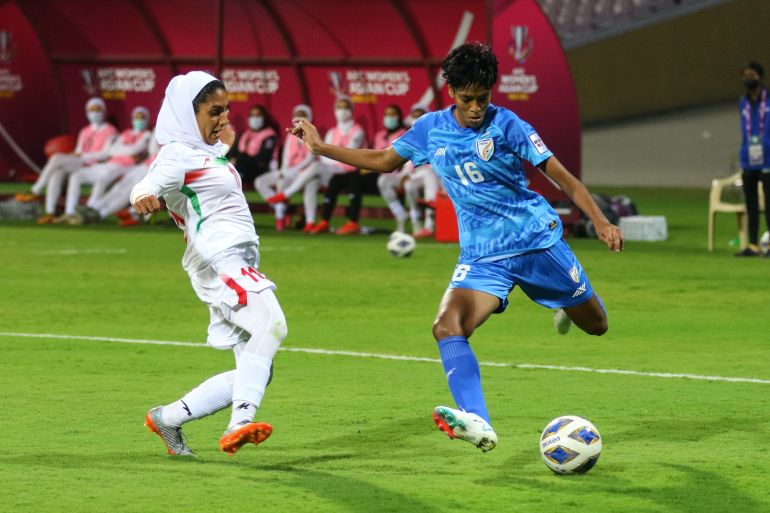
Hoshiarpur, India: Manisha Kalyan’s sparse home and village give no indication that it would one day produce one of India’s top female footballers.
But Kalyan is a tough girl and, on Thursday, the 20-year-old player with Cyprus’s champions Apollon Ladies became the first Indian participant to take part in the UEFA Women’s Champions League during the first round of qualifying.
Keep reading
list of 4 itemsMoroccan club ‘wins’ cup tie 3-0 after Algerian hosts confiscate kits
‘You lost the league’: Derby loss spoils Klopp’s perfect Liverpool sendoff
Struggling Everton dent Liverpool title hopes in pivotal Merseyside derby
Kalyan’s transition from a teenage athlete to a sought-after professional footballer happened gradually over seven years.
“I was into sprinting and basketball. After practice, I used to play football with the boys. One day, my coach saw me kicking the ball around and asked if I wanted to play football. I said yes,” Kalyan told Al Jazeera over the phone from Limassol.
In November 2021, Kalyan made the headlines when she scored for India against Brazil in a four-nation tournament in Manaus.
Even though India lost 6-1, Kalyan’s feat went down in the history books.
She made her Indian senior team debut at 17 in January 2019 against Hong Kong. In the 2019 AFC U19 Women’s Championship qualifiers, she scored a hat-trick in India’s 18-0 win over Pakistan.
Kalyan also played a key role in India’s 1-0 win over Thailand.
The All India Football Federation named her the Emerging Player of the Year in 2020-21. Earlier this month, Kalyan was named footballer of the year for the 2021-22 season.
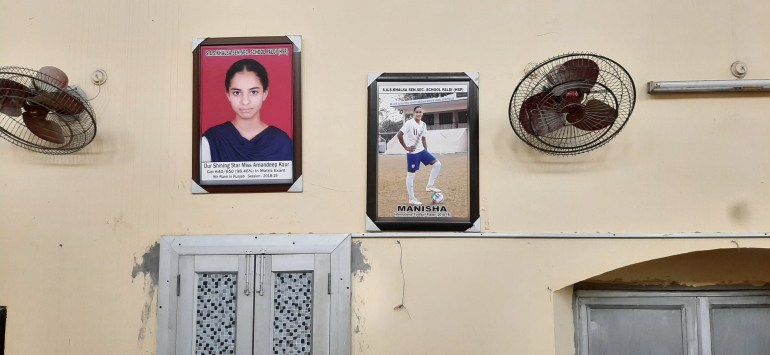
A 52-year-old Brahmjit Singh was the coach who spotted Kalyan’s talent as a PE teacher at the Government Middle School in her village Muggowal.
“Manisha’s footwork was amazing. I convinced the principal to meet her parents. Her father was happy to hear about her talents and permitted me to train her,” Brahmjit told Al Jazeera.
As Brahmjit’s training helped her get selected for the district team, Kalyan had to bid farewell to athletics.
“Since then, no other sport other than football have given me pleasure,” said Kalyan.
Her father, 60-year-old Narinder Pal, had been into astrology and brokering property and had sold cosmetics before an accident in 2012 that left him half paralysed.
He was landed with a hospital bill of 800,000 Indian rupees ($15,000 in 2012) which forced him to sell his land.
“I gave her the freedom to choose what she wanted,” he said, sitting in his living room, which also serves as a bedroom.
“When she said she wanted to play football, I said there is no women’s football team in our village. She said she’d play alone.”
But Kalyan playing football with boys did not go down well with the villagers.
“People began talking, and I said: ‘no worries’. Boys and girls have equal rights. Manisha went for tournaments in far-away villages with the boys’ teams. Ten boys and a girl,” Pal added.
During a boys’ tournament, Kalyan tied a towel around her hair to look male but it came loose during the match and she was found out.
“But no one made an issue, Instead, they praised me,” she said.
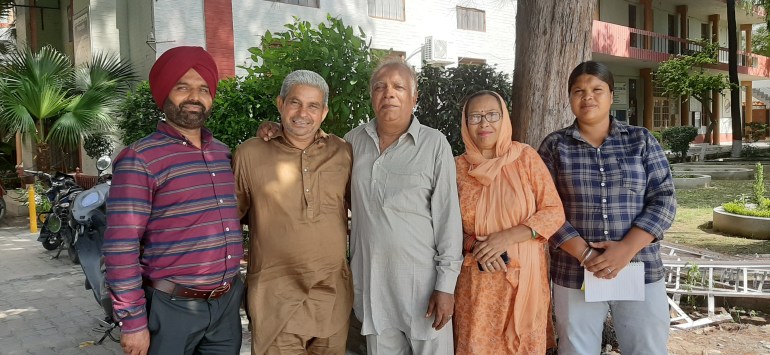
Her mother, 55-year-old Rajkumari, remembers Kalyan as a naughty and stubborn child.
“I never asked her to do the dishes and wash the clothes. She’s always been very active and was fond of aloo ka paratha [potato-stuffed Indian bread]. When people did the talking, I told them girls aren’t any lesser. I gave her money meant for home expenses so she can play tournaments elsewhere,” she told Al Jazeera.
Her eldest sister Sonam said Kalyan did not even have a proper football kit.
“She kept a worn-out boot for a long time, saying Brahmjit [her coach] bought it, and it’s a lucky charm. At other times, Teja Singh, a UK businessman from the village, helped.”
Sonam, 32, used to work as a domestic helper and cook. After losing both jobs during the COVID-19 lockdowns, she now works as a security guard at King Edward Public School.
She said Kalyan did not shy away from picking fights with other kids, adding that as “we couldn’t afford a special sports diet for her, she thrived on home-made food”.
“When she took up the sports seriously, she cycled four kilometres (2.5 miles) daily to the gym in Mahilpur.”
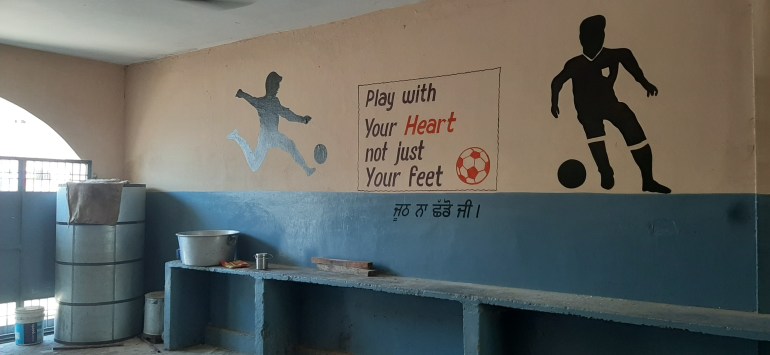
Despite her going places, Kalyan says she only finds true joy in hanging out with people she has known since childhood.
“I’m very close to my family and friends. Beyond football, my parents, sisters and education are the important things in my life.
“When I played Oorja Cup for Border Security Force, an officer asked me whether I could play for Mumbai’s Kenkre FC in the Indian Women’s League (IWL). I said I want family’s permission.”
Her family was initially reluctant to send her to clubs in faraway places, according to Priya PV, the head coach of Gokulam FC, for which Kalyan played three seasons in the IWL.
“I approached Punjab Football Association’s Vijay Bali to convince her parents. Female players early in their career generally don’t turn down officials at their local associations.”
Priya added that there was a talent shortage in Gokulam when the IWL started.
“So we hunted them in other states as many out there had not been signed by the clubs. Some of my colleagues opposed giving such an offer to a junior player. I considered her family situation as well. But of course, I had faith in her as a player. She’s very obedient and flexible.”
In addition to Kalyan’s impoverished circumstances, she also had to overcome psychological barriers.
“Earlier this year, I felt very demotivated at the Indian camp. I wanted to give my best, but that was not happening. There were doubts whether to do things this way or that way.”
Her senior, Indian goalkeeper Aditi Chauhan, talked her through those days.
“Aditi asked me what happened. When I told her about my fears, she asked me why I started playing. When I said it was to find pleasure, she told me to go and find that pleasure again. She told me to keep trying and never give up. I felt high again. I began to replay how I started, how I survived, how I reached where I am.”
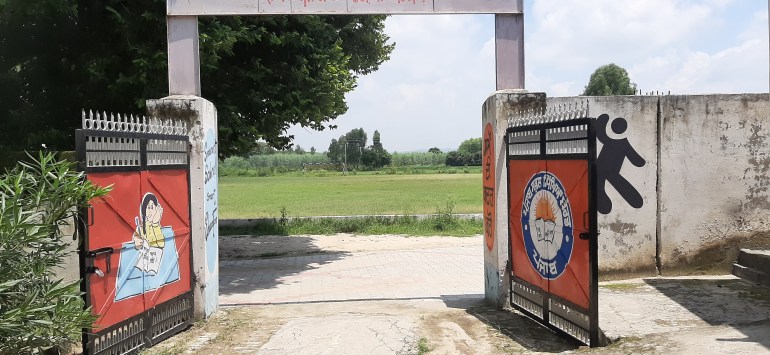
Mahilpur is regarded as the football nursery of India, with its schools and academies producing hundreds of male players for the police, state and national teams.
“Occasionally, girls too became players but Manisha’s feat surpassed all,” Jaspal Singh, a certified sports trainer and the principal of the SGGS Khalsa College in Mahilpur, told Al Jazeera.
In Paldi, near Kalyan’s village, Sant Attar Singh Khalsa Senior Secondary School, where Manisha joined ninth grade, houses a free sports hostel where dozens of young footballers are trained.
“Practice for girls happens before boys. Kalyan never came late for the 7am practice. She reached the ground either by bicycle or bus,” recalled principal Shiv Kumar.
A year later, Kalyan was representing India U-17.
‘Opportunity to build careers’
Though the Indian women’s team was among the leading sides in Asia in the mid-1970s to early 1980s, there was a lull until the gold in the 2010 SAFF Women’s Championship and the four editions of the championship that followed.
In 2016, the AIFF launched the IWL, prompting leading clubs to build women’s teams.
“Earlier, female players retired after a few games for their states and universities. Now they have the opportunity to build careers. There’s growth in audience, sponsors and media attention as well,” said Hubaib Kurukkanat, a sports journalist.
“Foreign clubs signing Indian players is an indication.”
Kurukkanat predicts that Indian women will take part in a football World Cup before the men’s team and that can spur growth at the grassroots.
India is also scheduled to host hosting FIFA U-17 Women’s World Cup in October.
As she enters the history books again, Kalyan has kept her eyes firmly on her personal and team goals.
“One day, I want to play for the biggest club in the world. I also want to see my national team playing the World Cup,” said Manisha, who religiously watches YouTube videos of her heroes Ronaldinho, from Brazil, and the Argentine Lionel Messi.